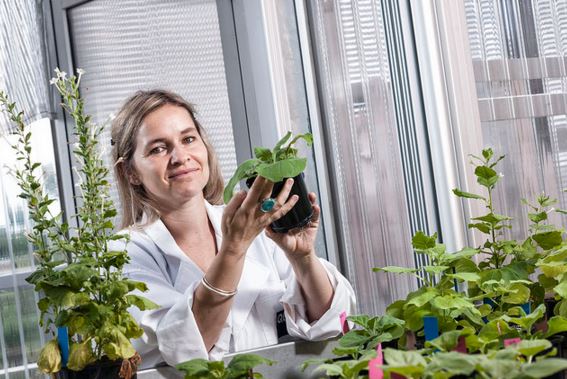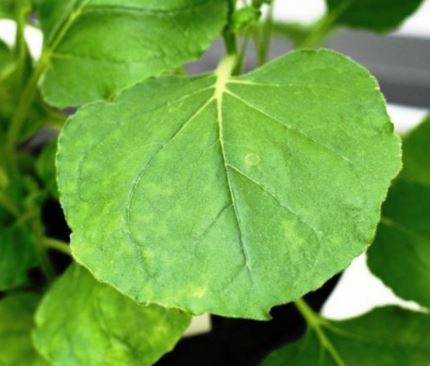Australian scientists have discovered a gene in Pitjuri (Nicotiana benthamiana), an ancient tobacco plant indigenous to Agoriginal tribes, that could aid space farming. The gene could be used to make plants grow and flower super-fast in arid environments.
Plant geneticist, Professor Peter Waterhouse, who works at the Centre for Tropical Crops and Biocommodities, part of Queensland University of Technology (QUT), made the discovery while tracing back the history of the Pitjuri plant. For several years geneticists have used the plant as a model upon which to test vaccines and viruses.
“This plant is the ‘laboratory rat’ of the molecular plant world. We think of it as a magical plant with amazing properties. We now know that in 1939 its seeds were sent by an Australian scientist to a scientist in America and have been passed from lab to lab all over the world.”
 Professor Peter Woodhouse with the tobacco plant (Nicotiana benthamiana) that shut down its defense mechanism and grows super fast.
Professor Peter Woodhouse with the tobacco plant (Nicotiana benthamiana) that shut down its defense mechanism and grows super fast.
“By sequencing its genome and looking through historical records we have been able to determine that the original plant came from the Granites area near the Western Australia and Northern Territory border, close to where Wolf Creek was filmed.”
“We know, through using a molecular clock and fossil records, that this particular plant has survived in its current form in the wild for around 750,000 years.”
How did it manage to survive for so long?
QUT Research Fellow, Dr. Julia Bally, lead researcher in this latest study, said that determining exact species has led scientists on a quest to find out how this plant managed to survive so long in the wild.
The researchers have published their findings in the academic journal Nature Plants.
Nicotiana benthamiana lost its immune system and concentrated all its resources on ultra-rapid germination, growth, and flowering. It even thrives in drought-like conditions.
Dr. Bally said:
“What we found may have a big impact on future plant biotechnology research. We have discovered that it is the plant equivalent of the nude mouse used in medical research. The plant has lost its ‘immune system’ and has done that to focus its energies on being able to germinate and grow quickly, rapidly flower, and set seed after even a small amount of rainfall.”
“Its focus is on creating small flowers but large seeds and on getting these seeds back into the soil in time for the next rain. The plant has worked out how to fight drought – its number one predator – in order to survive through generations.”
 Dr. Bally believes their discovery will have a major impact on biotechnology research.
Dr. Bally believes their discovery will have a major impact on biotechnology research.
Space farming an intriguing option
Prof. Waterhouse said researchers could use this discovery to seek out other sterile growing environments where plants were protected from disease – with space being an intriguing option.
Prof. Waterhouse said:
“So the recent film The Martian, which involved an astronaut stranded on Mars growing potatoes while living in an artificial habitat, had a bit more science fact than fiction than people might think.”
The scientists believe their findings may also have implications for future genetic research here on Earth.
Prof. Waterhouse said:
“Scientists can now know how to turn other species into “nude mice” for research purposes. So just as nude mice can be really good models for cancer research, “nude” versions of crop plants could also speed up agricultural research.”
The fact that the Pitjuri variety from central Australia had doubled its seed size paved the way for research into how it could be used commercially as a bio-factory – seeds are an ideal place in which to make antibodies for pharmaceutical use.
Prof. Waterhouse invites researchers across the globe to access his open source website, where they can study the genomes of seven family members.
Prof. Waterhouse and Dr. Bally have lodged a patent on their findings (Organisms with Modified Growth Characteristics and Methods of Making Them).
Citation: “The extremophile Nicotiana benthamiana has traded viral defence for early vigour,” Fangzhi Jia, Julia Bally, Kenlee Nakasugi, Hyungtaek Jung, Simon Y.W. Ho, Mei Wong, Craig C. Wood, Chloe M. Paul, Fatima Naim, Ross N. Crowhurst, Peter M. Waterhouse, Roger P. Hellens and James L. Dale. Nature Plants. 2 November, 2015. DOI: 10.1038/nplants.2015.165.

